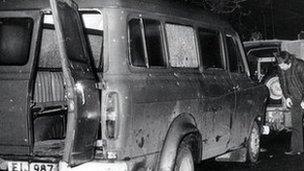Paterson will not ask PSNI to re-open Kingsmills probe
- Published

The bullet-riddled minibus in which 10 Protestant workmen were massacred
The secretary of state has told some of the relatives of the 10 men who died in the Kingsmills massacre that he is not prepared to intervene politically.
Owen Paterson said he would not call on the PSNI to re-open their investigation into the murders.
A delegation representing the families also met Assistant Chief Constable Drew Harris on Monday.
They gave him a file, which included information and a number of queries.
A police spokesperson said ACC Harris undertook to study the file and "commission work to address issues raised by the families".
Another meeting will take place in about six weeks.
Ten Protestant textile workers were murdered in the atrocity in south Armagh in January 1976.
Ulster Unionist MLA Danny Kennedy, who met Mr Paterson with some of the families, said the secretary of state believed the investigation was a devolved matter.
Mr Kennedy said the meeting with Mr Paterson fell short of what the families had hoped for.
Public inquiry
Mr Paterson said it would be "quite wrong of me to raise their hopes" that he could some how overrule the whole system and impose.
"I do not have a drawer full of fresh evidence and I certainly do not have the political remit to overrule the correct procedures of law and order - they are that following an HET report, police have the right to take charges forward should there be enough evidence, then the process of rule of law should take its place," he said.
"It certainly never was the role of the secretary of state to override the operational independence of the police force."
The meetings follow the publication in June of a report into the murders by the Historical Enquiries Team (HET).
It found that the IRA was responsible for the atrocity and that the Protestant victims were targeted because of their religion.
The families have called for a public inquiry into the killings.
Karen Armstrong, whose brother was one of those murdered, said: "All we want is for someone to have the common decency and courage to come back with us and give us information.
"We've had nothing down through the years, so something is better than nothing."
Monday's meetings were organised by unionist politicians Mr Kennedy and Jeffrey Donaldson.
Members of the south Armagh victims' group Fair are also accompanying the families.
Mr Kennedy said the relatives would be pressing for the police investigation into the killings to be re-opened, with a view to bringing those responsible to justice.
"Now that this report has been published, I believe the leadership of the republican movement has serious questions to answer about Kingsmills," he said.
18 gunshot wounds
"Why did this happen, why was it allowed to happen, who was involved and are they now prepared to accept full responsibility."
Mr Kennedy said the group also wanted to meet Irish prime minister Enda Kenny, to highlight the views of the Kingsmills relatives.
On 5 January 1976, the textile workers were travelling home from work on a minibus in the heart of rural County Armagh.
Just after the van cleared the rise of a hill, they saw a man standing in the road flashing a torch.
They stopped and 11 other men, all armed, emerging from the hedges around them.
Their first thought was that it was the Army, but the gunmen were masked.
A man asked the men their religions. There was one Catholic on the bus. He was identified and ordered away from his Protestant work mates. He was able to run off.
The 11 remaining men were then shot. One of them survived the massacre, despite having 18 gunshot wounds.
The IRA never admitted involvement and was supposed to be on ceasefire at the time.
The South Armagh Republican Action Force claimed the deaths. The HET reinvestigated the killings as part of work spanning three decades of conflict.
- Published16 June 2011
- Published21 June 2011